Philippines:
Duterte’s administration should be held accountable for the killings
of activists and human rights defenders
By
FORUM-ASIA
March 18, 2021
BANGKOK – The
Philippine Government must face international accountability for its
widespread killing of activists and human rights defenders, and the
grave human rights violations it has committed, seven human rights
groups said in a statement today.
On 7 March 2021, members
of the Philippine National Police (PNP) and the military killed nine
community-based activists and arrested six in coordinated raids
across four provinces, in a massacre that highlighted the continuous
attacks against the government’s critics. Two days prior to this
incident, Duterte had issued a shoot-to-kill order targeting
communist rebels, saying, ‘If the enemy is holding a gun, kill them.
Kill them right away.’ He further noted ‘Ignore human rights. That
is my order.’
‘Duterte’s inciting
rhetoric and terrorist-tagging of human rights defenders, activists
and critics have resulted in the harassment and violence against
them, as well as their death. This demonstrates the increasingly
dangerous space, not just for human rights defenders, but for all of
civil society and the Philippine people at large,’ said Shamini
Darshni Kaliemuthu, Executive Director of FORUM-ASIA.
Under Duterte’s
government, civil society and human rights defenders have found
themselves in danger particularly for opposing the government’s ‘war
on drugs’ and his repressive policies. Duterte has consistently
incited violence against his critics, while blaming human rights
defenders for the increase in the number of drug users. He has
threatened to behead human rights activists, and justified the
assassination of ‘corrupt journalists’, as he continues to promise
protections to police who follow these orders. There have also been
allegations where evidence was planted by the police and military
forces to justify the violence.
‘Despite the UN High
Commissioner for Human Rights report that details widespread and
systematic human rights violations by the government, including the
killing of human rights defenders, and a subsequent resolution
providing technical assistance on human rights to the government,
the violence and harassment against rights defenders have only
intensified. These killings highlight the need for an immediate
international investigative mechanism to ensure accountability for
all perpetrators,’ the Observatory for the Protection of Human
Rights Defenders said.
This crackdown on civic
space is being institutionalised through state policy. In July 2020,
the government implemented an Anti-Terror Law which allows a Council
composed of state officials to designate individuals as terrorists,
without a court order. A local resolution targeting left-leaning
personality with ‘drug-style’ operations was released in the
Cordillera region in February 2021. Government officials, and the
security sector continue to tag activists and civil society members
as terrorists, communists and subversives in their public speeches,
endangering their safety and security.
Since 2016 when Duterte
took power, FORUM-ASIA has documented at least 59 killings,
including extrajudicial killings of human rights defenders in the
country.
‘These attacks go beyond
individual killings; they reinforce an environment where people are
afraid to question and dissent, further perpetuating this cycle of
impunity. This proves that the UN Human Rights Council’s recent
resolution has been ineffective at stemming these violations, and
the international community must immediately initiate clear and
sustained action to hold the perpetrators to account,’ said CIVICUS
Asia Pacific researcher, Josef Benedict.
‘Domestic human rights
mechanisms remain compromised, while human rights defenders face
threats every day. An international investigative mechanism for the
extrajudicial killings related to the “war on drugs”, and the
killings of rights defenders, is even more imperative today, than it
has ever been,’ said the groups.
DPWH, LGU and
provincial government led the groundbreaking ceremony of new
Caibiran Municipal Building
|

Capsule
Laying of new Municipal Building in Caibiran, Biliran on
March 15, 2020. From right: Assistant District Engineer
Alfredo L. Bollido, District Engineer Ferdinand A. Briones,
Congressman Gerardo J. Espina Jr., Caibiran Mayor Rhodessa
D. Revita, Governor Rogelio J. Espina, Caibiran Vice Mayor
Linda V. Baleyos and Mr. Warlito B. Alagao. of W.B. Alagao
Construction. |
By
DPWH-Biliran
March 17, 2021
NAVAL, Biliran – A
new and a modern state of the art Municipal Building will soon rise
in the town of Caibiran as the Department of Public Works and
Highways (DPWH)- Biliran District Engineering Office (BDEO) kicks
off the construction of the building.
Caibiran Mayor Rhodessa D.
Revita and Vice Mayor Linda V. Baleyos led the groundbreaking
ceremony on Monday March 15 together with Congressman Gerardo J.
Espina Jr., Governor Rogelio J. Espina, DPWH-BDEO District Engineer
Ferdinand A. Briones, Assistant District Engineer Alfredo L. Bollido
and Mr. Warlito B. Alagao of W.B. Alagao Construction.
According to Briones, the
3-storey municipal building has a modern structural design with a
total floor area of 2,377.8 sqm and will rise in a 33x26 meter-lot
area.
“Maganda po ang soil dito
(site), the stability of the building is fair enough to sustain the
3 floors of the structure,” said Briones.
Briones added the new
Municipal Building has a complete civil, electrical, plumbing and
sanitary works including air conditioning and other wall finishes.
The said project has an appropriation amount of P30M under contract
with Chu Construction.
DE Briones revealed that
this project will be completed by early part of January or February
of 2022.
When completed, the new
municipal building will provide a spacious and a convenient
workplace for the LGU employees which in return will give a
hassle-free transactions and a more quality service for their fellow
Caibiranons.
Mayor Revita, in her
speech, expresses her gratefulness to Congressman Gerardo Espina Jr.
and Governor Rogelio Espina for their strong support in the
realization of this project.
According to the Mayor,
the said project is a dream come true for the people of Caibiran.
She encouraged her constituents to continue delivering good public
service to attain its vision for a more vibrant and revitalize
Caibiran.
Aside from the new
Municipal Building, DPWH-Biliran DEO will also implement a total of
P8M for the construction of new legislative building and P41M Water
Supply System in Caibiran town under FY 2021 implementation.
Domestic remedies for
PH rights abuses insufficient, illusory says INVESTIGATE PH Report
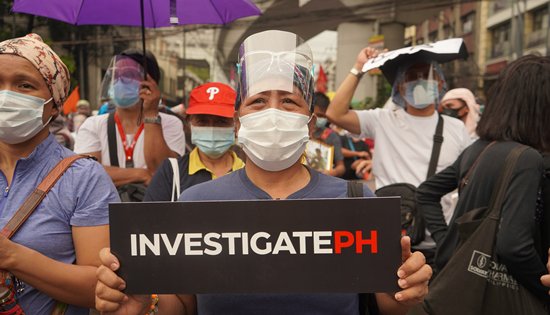
Global probe first report
recommends more action from UNHRC as PH rights situation went from
bad to worse
By
INVESTIGATE PH
March 17, 2021
MANILA – There is
strong evidence that “domestic remedies" for the many cases of human
rights violations in the Philippines “are insufficient and even
illusory” while cases of rights abuses escalate in the Philippines
according to the first Report of INVESTIGATE PH released Tuesday in
Geneva.
The 198-page report
confirmed and expanded on the June 2020 Office of the High
Commissioner for Human Rights (OHCHR) findings that there is a
"deepening human rights crisis in the Philippines."
“With the drug war, the
creation of the National Task Force to End Local Communist Armed
Conflict (NTF-ELCAC), the July 2020 passage of the Anti-Terrorism
Act (ATA), and the Philippine government’s militarized response to
COVID-19, the perpetration of human rights violations by state
forces has become more institutionalized, orchestrated, and
entrenched,” says the initial Report which examined 49 illustrative
cases of human rights violations that occurred largely during 2020
and 2021.
“The findings are a
damning indictment of the human rights crisis happening in the
Philippines,” says renowned human rights lawyer and INVESTIGATE PH
Commissioner Jeanne Mirer. “Not only that. We found out that
domestic remedies are ineffective at providing redress for the
victims,” Mirer adds.
While fellow Commissioner
and president of US-based National Lawyers Guild Atty. Suzanne Adely
highlights that “there is a grave power imbalance between victims of
state violence, and perpetrators who have the backing of government
apparatuses. As seen in the report’s findings, the structures to
even redress this imbalance are lacking.”
First of three reports by
INVESTIGATE PH, this initial paper will be followed by a second
report in July and final report in September 2021.
Domestic accountability
mechanisms “not working”
One of the claims of the
Philippine government in the recent Regular Sessions of the UN Human
Rights Council (UNHRC) is that domestic accountability mechanisms
are “functioning as they should.” However, INVESTIGATE PH Report’s
scoping review of cases, interviews with victims and witnesses, and
validation from a repository of currently available evidence, point
in the other direction.
The investigation
identified 10 indicators that led it to the conclusion that there is
failure of domestic remedies. Firstly, there is obstruction of state
authorities on investigations where police plant evidence and refuse
to comply with Supreme Court orders and requests by the Philippine’s
Commission on Human Rights to release documents.
The other nine indicators
discussed in the Report are: 1. investigations of violations are not
impartial; 2. available mechanisms for civilians to hold police and
military accountable are failing; 3. court protections are
inaccessible, slow, and discriminatory; 4. government’s NTF-ELCAC
constricts recourse to government agencies; 5. counter-insurgency
activities are targeting lawyers, denying victims access to
independent counsel; 6. efforts to challenge unjust laws through
legal channels are being dismissed in court or repressed; 7.
opposition political voices providing a check on the armed forces
and executive power have been eliminated from the Supreme Court and
Congress; 8. independent institutions and alternative platforms for
accountability have been eviscerated or made practically
inoperative; 9. even when remedies are secured, they are inadequate
justice.
UNHRC, world has to act
now
The Report and its
Recommendations were first presented to the UN High Commissioner for
Human Rights, Ms Michelle Bachelet, on Monday March 15 in Geneva.
One of its recommendations
is for the UNHRC to urge its member states, relevant United Nations
agencies, and other stakeholders to make use of international
mechanisms, saying that the Council need to create “commissions of
inquiry, fact-finding missions, or investigations, to help improve
the human rights situation in the Philippines, exert accountability,
and deliver measurable as well as reliable justice to victims.”
The Commissioners
emphasized the need for these measures. “There is a sense of urgency
here. The killings and degradation of human dignity are escalating
as seen in the Report. The UNHRC and the world has to rise to the
challenge of putting an end to this. We have to act now and save
innocent lives while we still can,” says INVESTIGATE PH Commissioner
Rev. Dr. Susan Henry-Crowe of the General Board of Church and
Society, the United Methodist Church.
As the Report is being
released publicly, there is news from the Philippines that a local
law enforcement committee in Cordillera, Northern Philippines, has
ordered a “tokhang” (purge) against “left leaning personalities.”
And Police raids in Southern Tagalog on March 7, 2021, resulted in
the massacre of nine trade unionists, indigenous leaders, and urban
poor organizers, suggesting events are on the cusp of heightened
bloodshed.
The recommendations also
asked for the International Criminal Court (ICC) to receive the
initial and succeeding reports of INVESTIGATE PH and “expedite the
process of bringing the preliminary examination to a conclusion.”
The Report also urged the global tribunal to “make a decision on
whether to seek authorization to open an investigation into the
situation in the Philippines.”
Philippine president
Rodrigo Duterte has continuously barred past UN investigations, and
even threatened to arrest an ICC prosecutor probing the “War on
Drugs”. In 2018, his administration’s Department of Justice sought
to place a UN special rapporteur on the rights of indigenous peoples
on a “terrorist” watch list.
“We launched this
investigation because our organisations stand unequivocally for
international human rights standards,” says Commissioner Dr. Agnes
Abuom who is the Moderator of the Central Committee of the World
Council of Churches.
“Our members and partner
churches in the Philippines have been the victims of the violations
themselves. Filipinos are calling for our help and INVESTIGATE PH is
a step towards exacting justice and protecting the many lives who
are in danger,” Abuom adds.
In the online launch of
the report, Commissioner Rev. Dr. Chris Ferguson of the World
Communion of Reformed Churches reiterated that “this investigation
raised hopes among the victims in search of justice. It raised hope
that help may be found from the international community. That is why
we have to play our part which is to seek the truth, challenge the
horrifying violations of human rights, use all available
international mechanisms to put an end to it all and ultimately, no
matter how protracted, hold the perpetrators accountable.”
Download Initial Report
here
CARD Sulit Padala
now available in more than 500 outlets nationwide
Press Release
March 15, 2021
SAN PABLO CITY – To
continuously provide access to fast, easy, and affordable remittance
service to clients, the financial institutions of CARD Mutually
Reinforcing Institutions (CARD MRI) has expanded its CARD Sulit
Padala remittance outlets to 534 cities and provinces in all regions
in the Philippines as of February 2021.
Initially, CARD Sulit
Padala was only offered by the banking institutions of CARD MRI
namely: CARD Bank, CARD SME Bank, and CARD MRI Rizal Bank Inc. in
2018. With the approval of Bangko Sentral ng Pilipinas (BSP), CARD,
Inc. (A Microfinance NGO) began to operate as a remittance sub-agent
of CARD Bank in 2019. Since then, the domestic remittance service
became known for its one-peso charge for first-time money senders.
It also offers as low as 1% remittance fee based on the principal
amount sent.
The additional outlets are
part of CARD MRI’s digital transformation campaign to widen its
reach to the rural communities it serves. Despite the on-going
health crisis, CARD MRI took it as an opportunity to boost its
services to its clients.
Said CARD MRI Managing
Director Flordeliza L. Sarmiento, “Our expansion to more locations
give access to remittance services even in the hardest-to-reach
areas. With the on-going pandemic, we aim so serve more communities
who might be of need of sending funds to their loved ones anywhere
in the country.”
She added that with the
newly opened outlets, clients can save on time and money for
transportation. “Since our remittance outlets are located in
barangays, our clients can conveniently send and receive
remittances. By saving their time, they can productively use it in
running their business, more time for their family and other
household chores. We also want to ensure the safety of our clients
by always adhering to health protocols while the pandemic is still
on-going.”
This February, CARD Sulit
Padala opened outlets in the provinces of: Lipa City, Batangas;
President Roxas, Capiz; Bangued, Abra; Kalipay, Masbate City; Apalit,
Pampanga; San Miguel, Bulacan; Antipolo City; and Guagua, Pampanga.
Sarmiento concluded that
CARD MRI’s unending mission for poverty eradication will
continuously push its charge to uplift the lives of Filipino
families in the country.
NMP Services
Association yields bountiful rice harvest
|
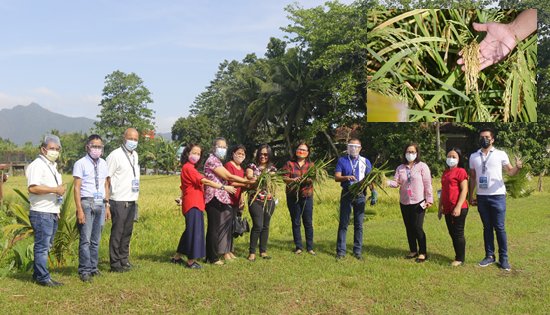
NMP
Officials and NMPSA Members witnessing local farmers gather the
first harvest of the NMP-NMPSA rice plantation. |
By
National Maritime
Polytechnic
March 11, 2021
TACLOBAN CITY – A
day of immense pride and joy for the National Maritime Polytechnic
Services Association (NMPSA), the sole and exclusive negotiating
agent of NMP as the fully-grown rice paddy in an approximately six
thousand two hundred square meters (6,200 sqm) is now being
hand-harvested after 4-5 months of cultivation.
It can be recalled that
NMP and the NMPSA entered into a Memorandum of Agreement (MOA) in
October 2020 allowing the latter to cultivate, by engaging a local
farmer, the former’s idle and unproductive land located at the back
of the General Services and Auxiliary Section (GSAS) Building.
This is in consonance with
certain provisions of the Collective Negotiation Agreement (CNA)
entered into by and between NMP and NMPSA particularly on the
“Association’s Entrepreneurial Activities” which allows the NMPSA to
engage in entrepreneurial activities within premises of the Agency,
at its own expense and responsibility aimed at improving the
economic conditions of its members.
In turn, the NMPSA through
a Contract of Agreement tapped a local farmer to cultivate and plant
rice on the subject land based on a 75/25 sharing of net harvest in
favor of the farmer.
“This is just one of the
many more fruitful collaborations of NMP and NMPSA. More is yet to
come with the end in view of enhancing employees’ productivity,
efficiency and work satisfaction, and to increase employees’
morale”, said NMP Executive Director Joel B. Maglunsod.
In response, NMPSA
President, Ms. Maria Chona B. Rama conveyed her appreciation to the
management.
“The NMPSA is grateful for
the constant support of the management in its cause of fostering and
improving the welfare and well-being of all NMP employees through
partnership in various activities”, she commented.
It is noteworthy that NMP
and the NMPSA signed a 3-year CNA on 11 November 2019, paving way
for a progressive and harmonious relationship, aimed at attaining
maximum efficiency in providing services to the public through
conduct of quality trainings and relevant researches.
Moreover, the CNA also
provides for the inclusion of NMPSA in committees and bodies
mandated by the Department of Labor and Employment (DOLE) and Civil
Service Commission (CSC) and the joint institution of cost-cutting
measures to generate savings without prejudice to the efficient
delivery of services to the Agency’s clients.
Rebel Returnees
as Peacebuilders in Eastern Samar
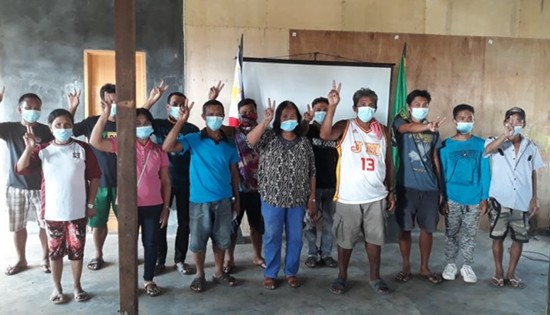
By
DPAO, 8ID PA
March 11, 2021
BORONGAN, Eastern Samar
– The government has further intensified the campaign against
communist rebels. Apart from the intensified military operations and
the neutralization of the communist rebel personalities, the
government is also utilizing the former rebels turned peacebuilders
as their allies.
About 31 former rebels,
yunit militia, organizers, and mass supporters in Eastern Samar have
expressed support to help convince their former comrades to turn
their back from the Communist Terrorist Group (CTG) during an
assembly held in Barangay Lalawigan, Borongan City on Tuesday, March
9, 2021.
Ka Olive, a former rebel
and President of the Eastern Samar Peacebuilders Group could not
hide her happiness as she looks back on how the local government and
law enforcement agencies helped her after surrendering two years
ago. She said she was not only given a second chance to be reunited
with her family but was also given financial assistance so she can
start anew.
“Malaki ang support nila (gobyerno)
sa amin, dahil kung wala siguro ay bumalık na kami doon sa bundok.
Malaki na rin ang pagkakaiba ng buhay namin ngayon kaysa noong nasa
sa bundok na wala kang aasahan; sa gobyerno natin malaki ang pag-asa,
marami ang tumulong at tutulong, maraming proyekto ang binibigay sa
amin,” Ka Olive said.
She added with the
creation of the peacebuilders group in Eastern Samar, peace-building
efforts and livelihood opportunities among the returnees will be
strengthened. It will also pave the way for more members of the CTG
to lay down their weapons and return to the folds of the law.
Another returnee, Ka
Dendong, assured the government of his full support in addressing
the decades-long insurgency problem in Eastern Visayas. He now leads
the campaign against the deceptive recruitment of the New People’s
Army encouraging youth not to be deceived by the false ideology of
the NPA, and how the communist group used legal organizations like
Anakbayan, Kabataan Partylist, and Karapatan to recruit students and
youth to join the armed struggle between the Armed Forces and NPA.
“Nakatulong kami di lang
sa aming barangay maging sa ibang tao, at makatulong sa ating
gobyerno na tapusin na ang mga NPA na walang mabuting naidudulot sa
atin,” Ka Dendong added.
Meanwhile, the 17-year old
Ka Lyn, one of the rebel returnees is hoping that like her, more
youth who were recruited by the NPA will finally decide to leave the
armed struggle. Like Ka Olive and Ka Dendong, she was also convinced
to be part of the rebel group because of their promise that she will
be sent to school to finish her education but instead become an
extortion collector in Balangiga town.
“Araw-araw nangongolekta
ako ng pera sa mga magsasaka. Kada buwan may naiipon akong tatlong
libo na binibigay ko sa kilusan. Kalaunan di ko na kayang mangolekta
lalo na sa mga magsasaka na hirap tustusan ang kanilang pamilya,” Ka
Lyn said.
The Commanding Officer of
the 78th Infantry Battalion, Lieutenant Colonel Oliver C. Alvior
said the Philippine Army and the Local Government Units are doing
the localize peace talks since military solution alone is not the
solution to the decades-long insurgency problem in Eastern Visayas.
“Grassroots yong ating
approach, sila na nandoon sa barangay, so when we organized them we
are identifying yong mga issues that are being used by the communist
terrorist group in exploiting them. So if we correctly identify yong
mga issues na yon, then we can provide the correct interventions, so
in doing so we can help them return to the mainstream, and prepare
them through proper interventions prepare them to become productive
citizen,” said LtCol. Alvior.
LtCol. Alvior added with
the full support of the peacebuilders and the community more NPA
rebels are expressing to surrender and avail of the programs offered
by the government to the rebel returnees.
“Pag nakita ng mga
kasamahan nila na nasa bundok pa, then it could be a testament,
evidence na the government is not only talking but putting into
actions yong ano yong mga nakasaad na objectives ng EO 70. So
pagmakita ng mga kasamahan nila yan and then less effort from us
sila na mismo ang magconvince kasi sila yong may mga contacts, sila
yong magcoconvince to follow their footsteps withdraw allegiance
with the communist party,” LtCol. Alvior said.
First batch of
Davao durian arrives Down Under
By
DTI-Foreign Trade Service Corps
March 11, 2021
MELBOURNE, Australia
– Australians will soon be tasting the sweet, savory, and creamy
durian from Davao as the Philippines’ first-ever shipment of frozen
durian from Davao City has arrived Down Under.
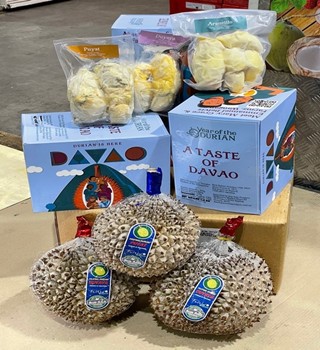 The initial shipment of
two varieties of durian called Puyat and Duyaya in whole pieces with
shell and a tasting sampler pack arrived at the Port of Melbourne on
Tuesday, 2 March, made possible by Melbourne-based importer, Aus
Asia Produce Pty Ltd. Aus Asia Produce is an Australian company that
specializes in importing and distributing exotic tropical fruits,
Asian vegetables, herbs and other products.
The initial shipment of
two varieties of durian called Puyat and Duyaya in whole pieces with
shell and a tasting sampler pack arrived at the Port of Melbourne on
Tuesday, 2 March, made possible by Melbourne-based importer, Aus
Asia Produce Pty Ltd. Aus Asia Produce is an Australian company that
specializes in importing and distributing exotic tropical fruits,
Asian vegetables, herbs and other products.
“The durian varieties
included in the shipment are Puyat and Duyaya. Puyat is sweet with a
hint of “bitterness” as desired flavor amongst new generation durian
connoisseurs. Whilst Duyaya has the most flesh of any durian I have
ever seen in my life, and I’ve eaten many before and this is even
more meaty,” said Thanh Truong, director of Aus Asia Produce Pty
Ltd.
“The first batch of
shipment also includes a Tasting Sampler Pack or Durian Box
containing 3 varieties of durian: Puyat, Duyaya and Arancillo
curated by “Year of the Durian” writer and traveller Lindsay Gasik,
the most travelled durian blogger in the world,” added Mr. Truong.
Philippine Ambassador to
Australia Ma. Hellen B. De Le Vega said this is a breakthrough
development that could further expand exports of other fruits and
vegetables from Mindanao. “The Philippine government continues to
find ways to make available our food products here in Australia and
we are working with stakeholders in government and in business to
deliver premium variety to the Australian market,” the Ambassador
said.
In the meantime, the
Department of Trade and Industry, through the Philippine Trade and
Investment Center (PTIC) in Sydney said the Philippines is looking
forward to more cooperation between Australian and Philippine
companies that will bring more Philippine high-quality, world-class
food products to Australia and make it available to both Filipino
and Australian mainstream consumers.
SFDEO paved a
road leading to Mapaso Hot Spring
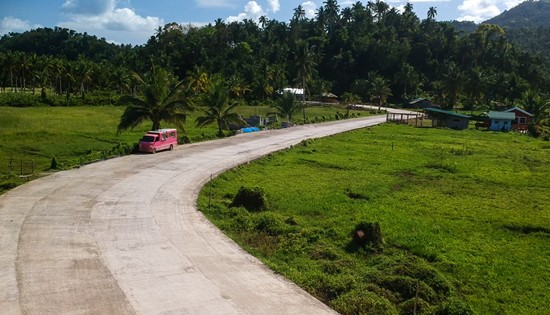
By
GISSELLE G. PARUNGAO
March 9, 2021
CALBAYOG CITY – To
boost the tourism industry in Calbayog City, DPWH Samar First
District Engineering Office has completed the road leading to Mapaso
Hot Spring with a revised contract amount of P26.9 million.
This road taps from an
existing road that leads to Maharlika Highway and will lead to one
of the leading tourist destinations in Calbayog City, the Mapaso Hot
Spring. The road spans 745 linear meters and a width of six (6)
meters and 1.5 meters concrete shoulders on both sides of the
carriageway. Reinforced concrete pipe culvert were also installed to
provide uninterrupted water flow of creeks located in the area.
Now, visitors can visit
Mapaso Hot Spring through Barangay Amampacang then to Dinagan,
Mabini and finally in Barangay Rizal II which is roughly 6.6
kilometers and with a vehicle, it will only take 15 minutes from
Maharlika Highway.
For adventure-seekers one
can reach the tourist destination through Oquendo Poblacion where
you would have to take a boat to cross a river (Oquendo River) going
to the hot spring which will take 30 minutes.
“This project is a great
help since it is now easier to travel and reach Mapaso Hot Spring.
Before, you have to walk on foot and cross a river to reach the
destination. This project is also a big help to the barangay because
there is now a much better road that we can use for travelling
unlike before that you have to cross a river. If more tourists will
visit this tourist destination, then more people can have work which
is being a tour guide. This road is a huge help because everything
and anything can pass through here”, said Kristine Pearl Yabut, a
resident living near Mapaso Hot Spring.
Hijos Tours grabs
finalist spot in Sustainability Innovations Pitch
Press Release
March 8, 2021
SAN PABLO
CITY – CARD MRI Hijos Tours was selected as one of the finalists in
the Society Category of the Sustainability Innovations Pitch on
February 22, 2021.